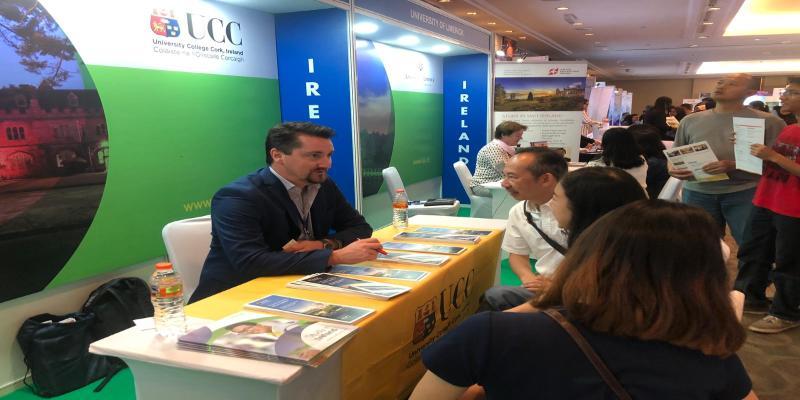In This Section
- Home
- Research & Innovation
- Stories with Impact
- College Team
- Programmes
- Hospital Partners
- Community Partners
- Jennings Gallery
- Graduate Studies
- Programmes for International (Non-EU) Students
- Interprofessional Learning (IPL)
- ASSERT
- Dr Ashleigh Byrne-O’Brien Memorial Fund
- iEd Hub
- Inaugural Professorial Lecture Series
- Learning, Teaching & Curriculum
- Philanthropic Lectures
- UCC Academic Health Sciences
- Continuing Professional Development
Q&A with our International Manager Gearoid McCarthy

Gearoid has worked in the internationalisation space for UCC for almost ten years, starting out as the ASEAN International Manager in the UCC Academy. Since 2017, he has worked as the Medicine & Health International Manager.
Q1. Tell me about your job?
My job is primarily oriented towards non-EU internationalisation activity. Within the College, and with the wider university team, I support student and staff mobility as well as research collaborations and partnerships with international universities. What remains central to my day-to-day activity is non-EU student recruitment. Across all six schools, I ensure that we hit our recruitment objectives in terms of numbers and diversity. I also work with a wide range of players and stakeholders external to UCC. These include Ireland’s extensive embassy network, student recruitment agents, government bodies like Enterprise Ireland, and, importantly, international schools.
Q2. How much travelling is involved? Where does it take you?
There is a good degree of travel involved in this role, but, clearly, there has been significant disruption to this since 2020. Pre-Covid, I could spend anything up to 12 weeks abroad in a given year, all of this across a range of geographies, but primarily, Southeast Asia, China/Hong Kong, East Asia, Middle East, India and West Africa. While reasonably successful when we had to pivot to online recruitment and other internationalisation activity, there is no substitute to the face-to-face value in what I do. Therefore, a return to boots on the ground is welcome, and I am coming off the back of two very successful trips to West Africa and East Asia earlier this year. I recognise the environmental necessity to take less flights, so finding the balance is key.
Q3. Where was the last place you visited? Tell me about it?
I visited Ghana with the School of Nursing & Midwifery in January. This was my first visit there, so there was a significant degree of preparation and planning required. We had hiccups and stressors along the way, including delays to visas and unreliable transport, but I like to think that with my experience in this space, none of these are insurmountable. Ghana is a fascinating country. It is colourful, musical, welcoming and full of excellent students looking for education opportunities abroad. Our primary objective in visiting was to source high-calibre nursing and public health students, and to build the UCC brand by linking in with state nursing bodies and universities of note. It was a hugely successful trip, and, to date, we have seen a five-fold increase on last year in Ghanaian applications for undergraduate and postgraduate programmes across the College of Medicine & Health.
Q4. What are the questions you get asked the most when meeting prospective students?
Understanding the cultural context of what I do is really important, so depending where I am visiting, there will be different priorities for students in terms of questions. For example, in many Asian countries, the decision to travel abroad to study is a family one so parents and guardians are particularly involved in the process.
Overall, though, when I am attending university education exhibitions, I am invariably asked the same ten questions a thousand times by students and their parents. These include,
“What is UCC most famous for?”
“Will there be good learning/career outcomes from my time there?”
“Is Ireland/Cork safe and welcoming?”
“Do you have any scholarships?”
“How is it different to the UK?”
Q5. What attracts students to studying at College of Medicine and Health at UCC?
Medicine looms large in terms of interest everywhere I travel. UCC has a long legacy of educating world-class medics, and this hasn’t gone unnoticed. This also transfers across programmes in the other schools. Dentistry, Pharmacy, Nursing & Midwifery, Public Health and the Therapies – they all enjoy considerable interest and demand because of their quality and post-graduation opportunities. Ireland, and particularly Cork, is now a global heavyweight in the Pharma/Bio-Pharma/Med Tech area, so this is also driving additional interest from students.
Another attraction is to be able to showcase our wonderful campus. I always invite prospective students to visit Cork and UCC, and many of them take me up on the invitation. Invariably, many will subsequently apply. And, don’t forget the fact that we are now the only English-speaking country in the EU (well, technically, we are one of two along with Malta!).
Q6. What is your key piece of advice to international students coming to UCC?
I know it’s a national obsession, but I do emphasise the weather and being prepared for it. Many incoming students will also be experiencing levels of independence they may be underprepared for, so it is important that they know what to expect. Otherwise, the advice centres around practical elements like cost of living, transport, bank accounts etc.
Gearoid advises students to download ‘Graduate Students: Coming to Cork’ handbook Graduate Students Coming to Cork V2.4 (ucc.ie). Researched and compiled by students on the Postgraduate Student Committee in the College of Medicine and Health it is especially valuable for international students who are new to Cork and to UCC. Includes information and tips for arriving in Ireland with sections on Housing, Personal Public Service Number (PPSN), Revenue, Money and Tax, Public and Personal Transport, Irish Mobile Phones, Health, Health Insurance, Shopping, Culture and National Holidays.
College of Medicine and Health
Coláiste an Leighis agus na Sláinte
Contact us
3rd Floor, Erinville, Western Road, University College Cork, T12 EKDO
